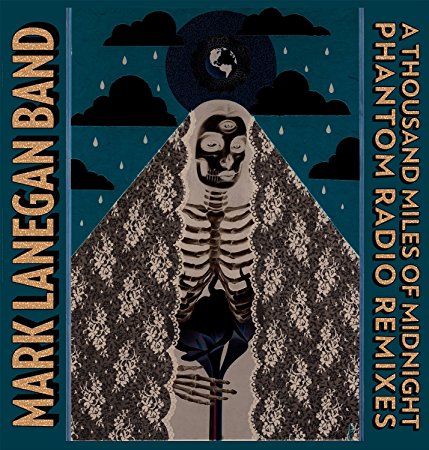Since forming the Screaming Trees in the mid-1980s Mark Lanegan has been viewed as a welcome figure on the alternative rock periphery. He has collaborated with everyone from Queens of the Stone Age and Greg Dulli (the Afghan Whigs/Gutter Twins) to Belle and Sebastian’s Isobel Campbell. For about thirty years, his prolific output has varied in style and content, but only within the last decade has Lanegan’s solo work taken an electronic turn. The standard feature of last year’s Phantom Radio – the album from which this remix collection sources its material – was a regimented, drum-machine-driven 4/4 march to the saloon at opening hour. Choosing “the path of least resistance”, Lanegan constructed a significant portion of the album with the help of FunkBox, a mobile phone app. Although Phantom Radio (along with its accompanying EP, No Bells On Sunday), showcased the sustained narrative thread of Lanegan’s exploration of blues and gospel, it felt somewhat lacking in sonic diversity.
A Thousand Miles of Midnight makes up for these shortfalls in atmosphere. Straight away, Mark Stewart’s opening remix of Death Trip to Tulsa sets the dense, dark mood with discordant guitar loops, synthesised sweeps and full-fat drums. Greg Dulli follows suit with binaural arpeggios and sensual chords that sympathetically carry Lanegan’s voice closer to the burial mound on I’m the Wolf. Reimagined works by UNKLE and Moby serve much the same purpose; providing a tense, thriller bed for the singer’s voice and a complementary ambience to his lyrical content. Most of the tracks on this compilation explore the inherent tensions that become apparent when songs with meaning are transformed into companions for a furious heart beat. Which begs the question: is this something we should be listening to and trying to understand or simply dance with reckless abandon? Dry Iced (Thomas Barfod Remix) responds to this query sideways by foregoing clubland and opting instead for an early morning drive towards a twilight murder.
There are some unexpected moments too. Alastair Galbraith’s remix of The Wild People strips the track back to vocals, upturned bass and incidental background noise. Its sparse, downtime-jazz-feel is reminiscent of Jim Jarmusch’s Dead Man (1995) universe: monochrome and deadly. Towards the end of the album, for nearly eight minutes, Soulsavers’ ‘aural disorientation’ reworking of Jonas Pap, offers a droning reprieve to the standardised running order of the record. It bears little resemblance to the original folk ballad and is perhaps the most fearless track on the album for this reason. Moon Gang’s remix of No Bells On Sunday complements this trajectory by (almost) doing away with Lanegan, turning what was essentially a song of hope into its melancholic doppelgänger.
If one may be so bold as to use one’s personal tastes as a barometer, with which to measure the significance of the cultural output spewing forth from the Western hemisphere, then perhaps one would be speaking for many, when saying that the primary seductive characteristic of Mark Lanegan’s solo output is his voice. There’s something at once paternal and dangerous attached to it. Mark Lanegan often gets compared to Tom Waits, precisely because of their shared affinity for vocal cords wrought by whiskey and heartbreak. Their songwriting, however, differs. Waits is a storyteller, while Lanegan is a romantic. A Thousand Miles of Midnight does well to elevate gruff beauty above the electronic landscape, but it also augments certain phrases that perhaps weren’t first apparent on Phantom Radio/No Bells On Sunday. Perversely, this compilation works better, as a complete conceptual whole, than the original. This shouldn’t be considered a criticism of Lanegan as a songwriter per se. Instead, A Thousand Miles of Midnight should be seen as an ambitious work, which diversifies Lanegan’s canon and exposes him to a wider audience; something he wholeheartedly deserves.
A Thousand Miles of Midnight is out now via Heavenly Recordings.
[youtube https://www.youtube.com/watch?v=FUQ_y3Fn58k]













No Comment